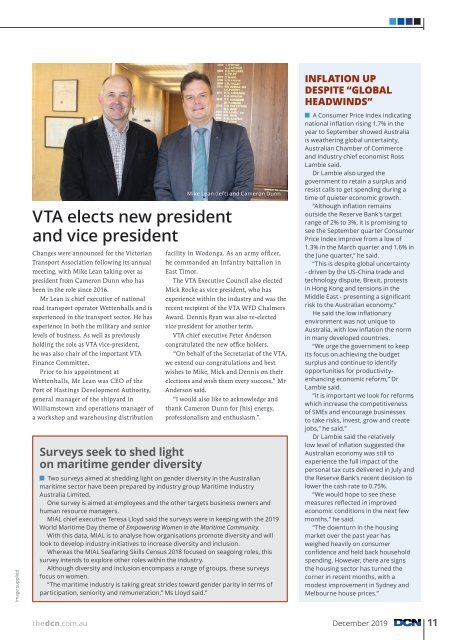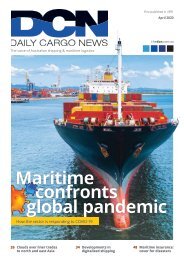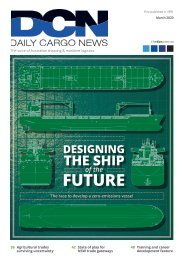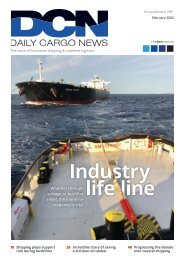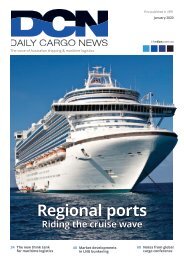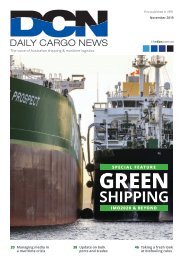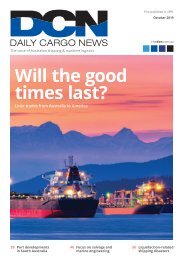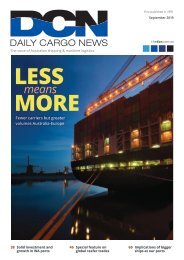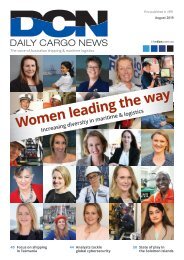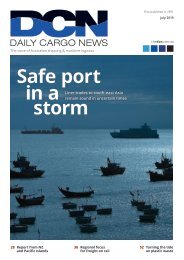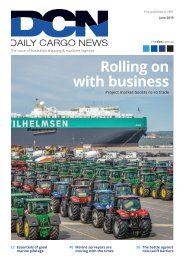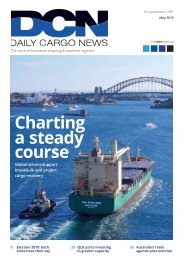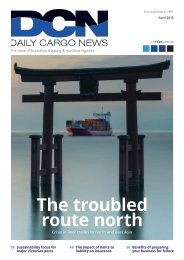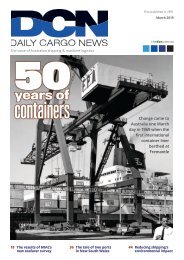DCN December Edition 2019
You also want an ePaper? Increase the reach of your titles
YUMPU automatically turns print PDFs into web optimized ePapers that Google loves.
INFLATION UP<br />
DESPITE “GLOBAL<br />
HEADWINDS”<br />
Image supplied<br />
VTA elects new president<br />
and vice president<br />
Changes were announced for the Victorian<br />
Transport Association following its annual<br />
meeting, with Mike Lean taking over as<br />
president from Cameron Dunn who has<br />
been in the role since 2016.<br />
Mr Lean is chief executive of national<br />
road transport operator Wettenhalls and is<br />
experienced in the transport sector. He has<br />
experience in both the military and senior<br />
levels of business. As well as previously<br />
holding the role as VTA vice-president,<br />
he was also chair of the important VTA<br />
Finance Committee.<br />
Prior to his appointment at<br />
Wettenhalls, Mr Lean was CEO of the<br />
Port of Hastings Development Authority,<br />
general manager of the shipyard in<br />
Williamstown and operations manager of<br />
a workshop and warehousing distribution<br />
Surveys seek to shed light<br />
on maritime gender diversity<br />
Mike Lean (left) and Cameron Dunn<br />
facility in Wodonga. As an army officer,<br />
he commanded an Infantry battalion in<br />
East Timor.<br />
The VTA Executive Council also elected<br />
Mick Rocke as vice president, who has<br />
experience within the industry and was the<br />
recent recipient of the VTA WFD Chalmers<br />
Award. Dennis Ryan was also re-elected<br />
vice president for another term.<br />
VTA chief executive Peter Anderson<br />
congratulated the new office holders.<br />
“On behalf of the Secretariat of the VTA,<br />
we extend our congratulations and best<br />
wishes to Mike, Mick and Dennis on their<br />
elections and wish them every success,” Mr<br />
Anderson said.<br />
“I would also like to acknowledge and<br />
thank Cameron Dunn for {his} energy,<br />
professionalism and enthusiasm.”.<br />
Two surveys aimed at shedding light on gender diversity in the Australian<br />
maritime sector have been prepared by industry group Maritime Industry<br />
Australia Limited.<br />
One survey is aimed at employees and the other targets business owners and<br />
human resource managers.<br />
MIAL chief executive Teresa Lloyd said the surveys were in keeping with the <strong>2019</strong><br />
World Maritime Day theme of Empowering Women in the Maritime Community.<br />
With this data, MIAL is to analyse how organisations promote diversity and will<br />
look to develop industry initiatives to increase diversity and inclusion.<br />
Whereas the MIAL Seafaring Skills Census 2018 focused on seagoing roles, this<br />
survey intends to explore other roles within the industry.<br />
Although diversity and inclusion encompass a range of groups, these surveys<br />
focus on women.<br />
“The maritime industry is taking great strides toward gender parity in terms of<br />
participation, seniority and remuneration,” Ms Lloyd said.”<br />
A Consumer Price Index indicating<br />
national inflation rising 1.7% in the<br />
year to September showed Australia<br />
is weathering global uncertainty,<br />
Australian Chamber of Commerce<br />
and Industry chief economist Ross<br />
Lambie said.<br />
Dr Lambie also urged the<br />
government to retain a surplus and<br />
resist calls to get spending during a<br />
time of quieter economic growth.<br />
“Although inflation remains<br />
outside the Reserve Bank’s target<br />
range of 2% to 3%, it is promising to<br />
see the September quarter Consumer<br />
Price Index improve from a low of<br />
1.3% in the March quarter and 1.6% in<br />
the June quarter,” he said.<br />
“This is despite global uncertainty<br />
- driven by the US-China trade and<br />
technology dispute, Brexit, protests<br />
in Hong Kong and tensions in the<br />
Middle East - presenting a significant<br />
risk to the Australian economy.”<br />
He said the low inflationary<br />
environment was not unique to<br />
Australia, with low inflation the norm<br />
in many developed countries.<br />
“We urge the government to keep<br />
its focus on achieving the budget<br />
surplus and continue to identify<br />
opportunities for productivityenhancing<br />
economic reform,” Dr<br />
Lambie said.<br />
“It is important we look for reforms<br />
which increase the competitiveness<br />
of SMEs and encourage businesses<br />
to take risks, invest, grow and create<br />
jobs,” he said.”<br />
Dr Lambie said the relatively<br />
low level of inflation suggested the<br />
Australian economy was still to<br />
experience the full impact of the<br />
personal tax cuts delivered in July and<br />
the Reserve Bank’s recent decision to<br />
lower the cash rate to 0.75%.<br />
“We would hope to see these<br />
measures reflected in improved<br />
economic conditions in the next few<br />
months,” he said.<br />
“The downturn in the housing<br />
market over the past year has<br />
weighed heavily on consumer<br />
confidence and held back household<br />
spending. However, there are signs<br />
the housing sector has turned the<br />
corner in recent months, with a<br />
modest improvement in Sydney and<br />
Melbourne house prices.”<br />
thedcn.com.au <strong>December</strong> <strong>2019</strong> 11


